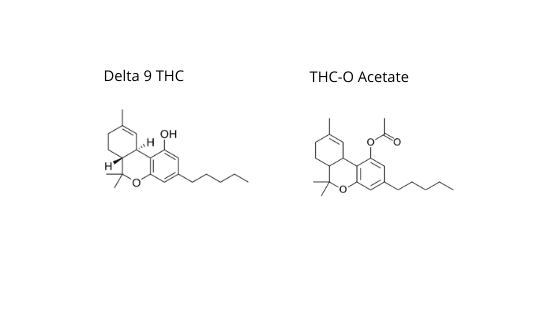Since 2018, the hemp revolution has brought us a wide range of new and exciting compounds. First, CBD became a household name, being sought-after by both experienced herb lovers and tee-totaling grandmothers for its incredible therapeutic benefits.
Next, the public got to know alternative cannabinoids like cannabigerol (CBG) and cannabinol (CBN). After that, delta-8 hit the scene, followed by its more sativa-like sister delta-10.
These days, a compound called THC-O acetate is taking the spotlight. With much more potent effects than regular delta-9 tetrahydrocannabinol (THC), THC-O acetate has quickly captured the interest of consumers.
If you’re like most people, you may find keeping up on all the latest hemp-derived compounds a bit challenging. So, we’ve prepared this short guide so you’ll be armed with everything you need to know about THC-O acetate before you make your next purchase.
What Is THC-O Acetate?
THC-O acetate also called aTHC or simply THC-O, is an acetylated form of THC made from adding an acetyl group to a regular THC molecule. Pharmaceutical manufacturers often acetylate common drugs to make them more bioavailable for the human body. A prime example is aspirin, which is produced by adding an acetyl group to salicylic acid.

Adding the acetyl group makes the THC molecule bind stronger with CB-1 receptors in the brain. Most estimates consider THC-O acetate as much as three times more potent than regular THC. Many THC-O acetate consumers describe the experience as being more psychedelic and spiritual than the effects of typical THC.
How Is It Made?
Unlike delta-8 and CBD, THC-O acetate isn’t naturally present in hemp plants. Researchers conducting military experiments at Edgewood Arsenal in Maryland were the first to create the compound way back in the late 1940s.
Searching for a non-lethal incapacitating agent, military chemist Dr. James Ketchum manufactured the original THC-O acetate using regular delta-9 tetrahydrocannabinol (THC). These days, hemp companies make it from delta-8 THC distillate to maintain compliance with the 2018 Farm bill, which regulates industrial hemp and hemp derivatives.
THC-O acetate first showed up on the street scene in the 1970s after author D. Gold published instructions for making the compound in his 1974 book Cannabis Alchemy: The Art of Modern Hashmaking. However, we don’t recommend making THC-O acetate at home.
The method for creating THC-O acetate involves advanced chemistry using several volatile, caustic, and flammable chemicals. Producing THC-O should only be attempted by trained chemists in professional laboratories with specialized safety equipment.
What Is the Difference Between Regular THC, Delta-8, and THC-O Acetate?
While regular THC, delta-8, and THC-O acetate are technically cannabinoids, they produce markedly different effects. Typical cannabis flower contains delta-9 THC, which imparts its psychoactive effects by stimulating CB-1 receptors in the brain and central nervous system.
In the case of delta-8, a crucial double-bond is moved from the 9th position to the 8th in a long chain of carbon atoms. The result is a molecule that makes weaker bonds with the endocannabinoid receptors, producing more mellow psychoactive effects.
The double bond stays in place with THC-O acetate, but the addition of the acetyl group allows the compound to create powerful links to ECS receptors. This change makes THC-O’s effects up to 300% stronger than regular THC.
Does THC-O Acetate Have Any Medicinal Benefits?
THC-O acetate offers most of the benefits of regular THC, including:
- Reducing nausea and vomiting
- Stimulating appetite
- Soothing body aches
- Increasing mental focus
- Decreasing intraocular pressure
Since it is three times more potent than regular THC, it’s well-suited for people who don’t want to smoke or vape as much. THC-O products make excellent choices for people who use THC products for medical reasons.
The compound may work better when the person has developed a tolerance. Tolerance breaks aren’t always possible for patients using cannabis to treat severe symptoms like seizures, chronic pain, or the side effects of chemotherapy.
What Types of THC-O Acetate Products Are Available?
Manufacturers are beginning to offer THC-O in many of the same forms they do for CBD and delta-8, such as:
- THC-O Hemp Flower: THC-O hemp flower is just starting to show up on the scene, featuring flavors like Guava and Sour Glue.
- THC-O Hemp Pre-Rolls: You’ll find THC-O hemp pre-rolls in some of your favorite indica, sativa, and hybrid strains.
- THC-O Distillates: You can add THC-O distillates to your usual vape or bowl for an enhanced experience.
- Vape Carts: You can buy THC-O vape cartridges in a variety of flavors, such as Blue Dream, Sour Diesel, Grape Ape, and Pineapple Express. You’ll also find pre-filled disposable THC-O vape pens in a host of popular strains.
- Softgels: Convenient THC-O softgels make dosing easy and discreet.
As with any THC-containing product, it’s critical that consumers start with a low dose of THC-O. The effects of inhaled THC-O acetate can take up to 30 minutes to kick in, so consumers should begin with a small puff and wait at least ½ hour before taking more. Consuming too much can provoke paranoia or lead to fainting from a sudden drop in blood pressure.
Legality
THC-O presents a legal gray area since the compound can be made from either regular delta-9 THC or delta-8. The hemp-derived version of the compound is technically legal according to the text of the Farm Bill, which permits hemp plants and their derivatives as long as they contain less than .3% delta-9 THC.
However, several states have banned any version of THC, including delta-8 and THC-O acetate. Hemp manufacturers and lawmakers are also currently involved in an ongoing debate over a federal law passed in 1986 that made all THC analogs illegal.
Safety
Despite respected figures like Dr. Ethan Russo advising consumers to avoid the compound, THC-O acetate is perfectly safe if you buy it from a reputable source. The safety issues lie with amateur chemists who want to make a quick buck selling illegal hemp-derived products.
Although manufacturing THC-O acetate is a relatively straightforward process, the chemicals used are highly volatile and harmful if ingested or inhaled. The process of making THC-O acetate at home may also create dangerous byproducts. Removing these substances to produce clean final products is beyond the scope of even an educated do-it-yourselfer. Furthermore, detecting impurities in THC-O products requires expensive chromatography equipment that the average amateur chemist doesn’t own.
Untested, black market THC-O products may have toxic residual chemicals like sulphuric acid and acetic anhydride, two highly corrosive substances. Exposure to acetic anhydride can provoke a number of serious health issues, including lung damage and possibly cancer. Using sulfuric acid and acetic anhydride to create THC-O acetate should never be attempted outside of a laboratory equipped with a vacuum-powered laminar flow hood and other essential safety devices.
Consumers should make sure the products they buy have been tested by a third-party laboratory. Reputable companies will gladly provide official lab reports for all of their products in the form of Certificates of Analysis (COAs). COAs ensure that the products you buy are free of contaminants like mildew, pesticides, heavy metals, and residual solvents.
Although legal, lab-tested THC-O is safe, high-THC products aren’t suitable for everyone. We don’t recommend THC-O acetate for people who are completely new to cannabis products. Novice consumers would be better off starting with low-THC strains or delta-8 and delta-10 products.
Additionally, people with a family history of schizophrenia should avoid potent THC products, including THC-O acetate. THC consumption is one factor that can trigger the onset of genetic psychotic illnesses.
THC-O acetate may not be suitable for patients taking prescription medications and pregnant or nursing mothers. It’s always a wise idea to speak with your doctor before adding any cannabis product to your regular routine.
Will I Fail a Drug Test if I Take THC-O Acetate?
Unfortunately, you will probably fail a drug screening if you consume THC-O acetate. The acetylated form produces many of the same metabolites as regular THC and will likely trigger a positive on any screening for cannabis use. If you expect an upcoming drug test, you would be better off trying products containing CBD isolate for relaxation and relief.

